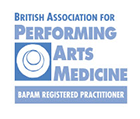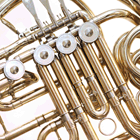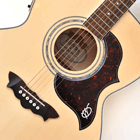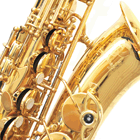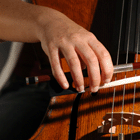
Research...
Focal Dystonia Publications MPIIQM
Focal Dystonia (click here to access the dystonia research page)
Patrice has published several scientific papers on focal dystonia, and offers treatment and rehabilitation for task-specific dystonia affecting musicians, also called musician's dystonia.
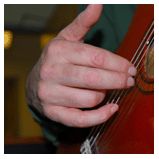 |
Focal dystonia is characterised by an involuntary and painless task-specific loss of control of one or more digits of the hand. On this picture, the guitar player is unable to control his right ring finger. The finger tends to curl into the palm of the hand involuntarily. |
Recent research in neurology has shown that the condition is associated with
changes in areas of the brain involved with the control of movement, and especially distortions in the representational zones of the digits in an area of the somatosensory cortex. The reason for these neurological changes may be due to the highly repetitive and almost simultaneous finger movements that musicians have to practise.
Dystonia is a very difficult condition to treat successfully, and recovery is more often partial than complete. Many musicians affected by dystonia are unable to continue their professional career.
However, several treatment protocols exist, aiming at reversing these neurological changes taking place in the brain. Patrice has completed a research study with a few bagpipers, two guitar players, two flute players, and an oboe player affected by focal hand dystonia. The first study was completed in 2010, and the 4-year long-term follow-up of this study was completed in March 2012.
Both studies have now been published in the journal "Medical Problems of Performing Artists" (list of publications). Click here to access the dystonia research page.
Development and validation of a self-report instrument to measure musculoskeletal pain in professional orchestra musicians in Scotland
(click here to access the pain research page)
The Performing Arts Medicine literature has grown substantially since 1980, and several prevalence studies on the topic of playing-related musculoskeletal disorders (PRMDs) affecting musicians have been carried out around the world among professional orchestra musicians. Very few of these prevalence studies have used existing validated questionnaires measuring musculoskeletal pain and, when did, no attempt was made to evaluate or confirm the validity and reliability of these instruments in a population of musicians.
The main aim of this study was to develop a questionnaire designed specifically for professional musicians that could be used to measure pain and its impact on playing a musical instrument. A second aim of the study was to gain an insight on the extent of muscle and joint problems among professional musicians from three major orchestras in Scotland, i.e. the Royal Scottish National Orchestra, the BBC Scottish Symphony Orchestra, the Scottish Chamber Orchestra.
The questionnaire was named the Musculoskeletal Pain Intensity and Interference Questionnaire for Musicians (MPIIQM). The study was completed in August 2013, was published online in June 2014, and in the journal Manual Therapy in December 2014. The article is made available for free by the journal until 9th January 2015: click this link to read it and download it. You can also find it in the "Publications" section of this website by clicking here.
The MPIIQM is now available as a User Guide with the full version of the questionnaire. You can download it from this website. Click here to download.
You can also read and/or download an abstract or a poster of the study. Click here to view the abstract.Click here to view the poster.
The prevalence rates of Playing-Related Musculoskeletal Problems (PRMPs) among professional orchestra musicians in Scotland, using the Musculoskeletal Pain Intensity and Interference Questionnaire for Musicians (MPIIQM), are now available (2016 publication). The full published article is available here. You can also download a conference poster which summarises the main prevalence results of the study.
| Clinics 7 Hillfoot Drive Bearsden G61 3QQ (Map) 07766 687578 |


